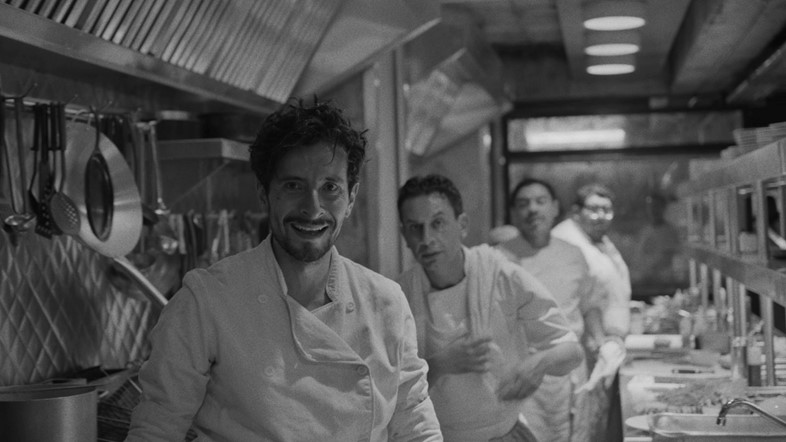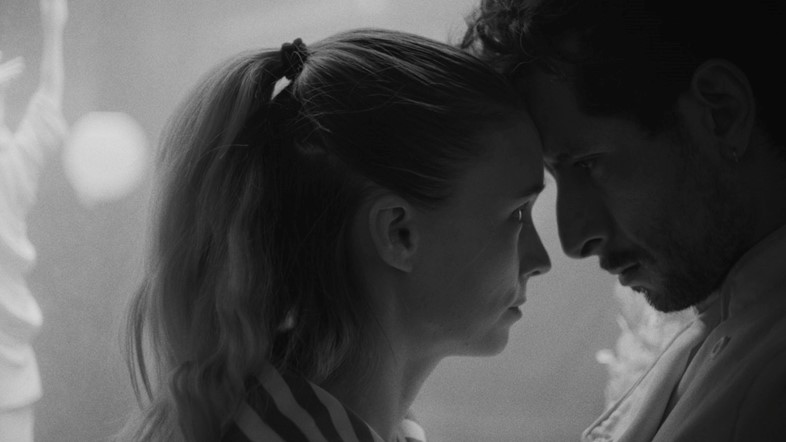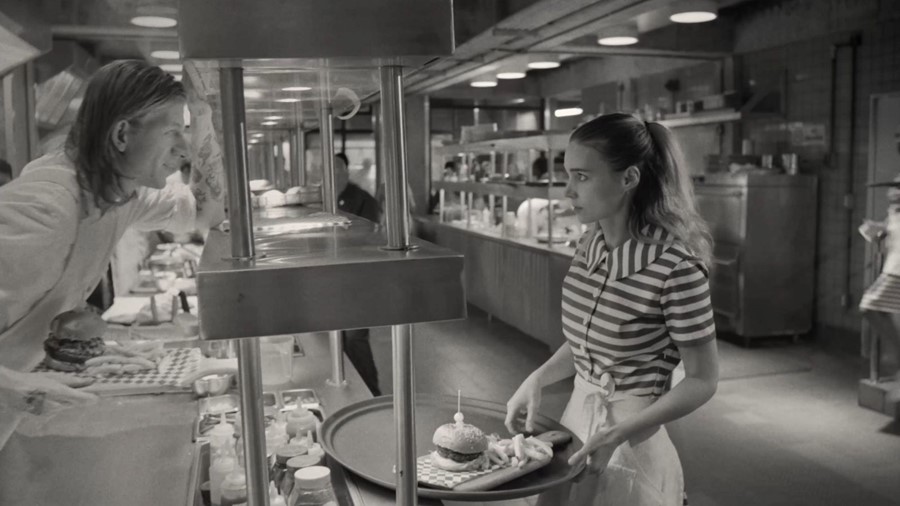Alonso Ruizpalacios’s searing new kitchen-set drama takes us inside the messy, chaotic heart of a Times Square restaurant
For nearly two decades, Alonso Ruizpalacios has been trying to cook up a comedy-drama about chaotic, charismatic restaurant workers who verbally and physically fight like family members. In 2010, Ruizpalacios wrote and directed a stage adaptation of Andrew Wesker’s 1957 play The Kitchen in Mexico (clips are available on his YouTube page), and in a 2014 interview, he announced that his next film would be titled The Kitchen. After further delays, Ruizpalacios was finally in preproduction for La Cocina – at his insistence, it would be called La Cocina, not The Kitchen – when someone told him about another comedy-drama about chaotic, charismatic restaurant workers who verbally and physically fight like family members.
“When I heard of The Bear, I was like, ‘Jesus Christ,’” Ruizpalacios tells me over coffee. “I wasn’t thrilled. But, at the same time, I was like, ‘Fuck it. This is my story.’ I made a point not to watch it, so as not to be in any way, positively or negatively, informed by it. I’ve heard it’s great. I’ll watch it one day. But I have to get this film out of my system first. This film is about something else. It’s about my dialogue with Wesker’s play, which is about late capitalism. It’s about his concern that mass production doesn’t leave space for what’s most important in life, for dreams, for relationships. That’s what the play is about, and that’s also what the film is about.”
The 46-year-old Mexican filmmaker is speaking to me during the London Film Festival at Sea Containers Hotel, not far from the spot in Piccadilly Circus where, as a student, he worked at the now-defunct Rainforest Cafe. “The kitchen and restaurant staff resented each other,” he recalls. “I witnessed it first-hand. When you’re in it, it’s not fun. But when you step outside, it’s hilarious.” Whereas The Bear is about cuisine so scrumptious that the cinematography celebrates each dish to salivating levels, Ruizpalacios considers La Cocina, his fourth feature, to be “anti-food-porn” and the opposite of Chef’s Table. “It’s showing the ugly side of the food industry where it’s about quantity, not quality,” he explains. “It’s about a middle-of-the-road restaurant for middle-class tourists, the kind that populate Times Square and Piccadilly Circus.”
While Wesker’s play is set in London, La Cocina shifts the action to a fictional establishment, The Grill in New York. There, in black-and-white, the food – probably cold, burnt, or both – is placed to the corner of the frame as kitchen staff prepare for the main feast: fisticuffs between co-workers; disgruntled dishwashers smashing plates; a sense that all the action in a restaurant is happening behind closed doors. The key figures in Ruizpalacios’s screenplay are Pedro (Raúl Briones Carmona), a bad-tempered Mexican cook, and his girlfriend, Julia (Rooney Mara), a waitress who’s taking the afternoon off for an abortion. “The only moment that’s close to food porn is when Pedro cooks Julia a sandwich,” says Ruizpalacios. “That’s the only time cooking becomes an act of love.”
At The Grill, the majority of the workers – well, not the front-of-house staff, who are nearly all white – are underpaid, illegal immigrants who could be deported if their unruly boss reports them. The stakes are already high when Pedro is accused of stealing $800 – also the amount he gives to Julia for her abortion – but then Ruizpalacios ensures that La Cocina is even more stressful to watch than, yes, The Bear. Incorporating monochrome cinematography, the kitchen turns into a gothic horror: everything that can go wrong, does go wrong, and does so in terrifying shadows. “The black-and-white allowed me to frame it like a fable, to make it more expressionistic, and to enhance that it’s dehumanising work,” says Ruizpalacios. “It erases the time specificity. You don’t know if it’s today or 30 years ago.”

In Ruizpalacios’s 2010 stage version of La Cocina, Carmona was among the ensemble, albeit in a different role from Pedro. For the movie, the director envisioned Carmona being paired with Mara due to her internal performances in films like Carol. “They’re a doomed Romeo and Juliet,” Ruizpalacios says of Pedro and Julia. “The actors create this impossible love that we want to succeed, but we know it won’t. That’s down to them being people with interesting inner lives and a lot of vibration inside. Rooney’s quiet on the outside, but intense on the inside.”
When pitching La Cocina to Mara, Ruizpalacios sent her a moodboard that listed the photographers who would inspire the film’s look: Masahisa Fukase (“he photographs snowy, blurry landscapes that are violent and wonderful”), the black-and-white period of Saul Leiter, and Louis Stettner’s snapshots of New York in the 1950s. While the notion of New York shot in black and white conjures up an image of Woody Allen’s Manhattan, Ruizpalacios depicts the less romantic side. “If you walk outside the main streets of Times Square, you have homeless people, and people pissing in the street,” he says. “When we were location scouting, we saw lots of people throwing up in Times Square. You never see that in movies. We were trying to show the puke of New York.”
Ruizpalacios’s three previous movies – Güeros, Museo, and A Cop Story – were set in Mexico, and in 2025 he hopes to shoot a Western set in Mexico. Adapted from Juan José Saer’s novel The Clouds, the director’s fifth feature will shift the action away from Argentina. “It’s in the Mexican-American war of 1847 where Mexico lost half of its territory to the United States,” says Ruizpalacios. “It’s about a psychiatrist who picks up three mental patients from Mexico, and has to drive them back across the border in the middle of this war to a sanatorium. It’s a meditation on how permeable borders really are – the border between one country and another; the border between sanity and insanity. They’re not hard lines.”

La Cocina, too, is concerned about borders, and Ruizpalacios has noticed that his interpretation of Wesker’s play has become more topical over its lengthy development. Not only was the screenplay inspired by the racism he experienced and witnessed at London’s Rainforest Cafe, he considers it a comment on the migrant experience. “How America is going to treat migration in the coming years concerns me a lot,” says Ruizpalacios. “When they talk about a crackdown on borders, they talk about numbers. They don’t seem to see that they’re talking about people, and these people bring in a lot of work. England, France and these first-world countries have profited for so long off migrants, and now they want to close their borders. It’s such a hypocritical attitude. La Cocina calls attention to that crisis.”
La Cocina is out in UK cinemas now.
